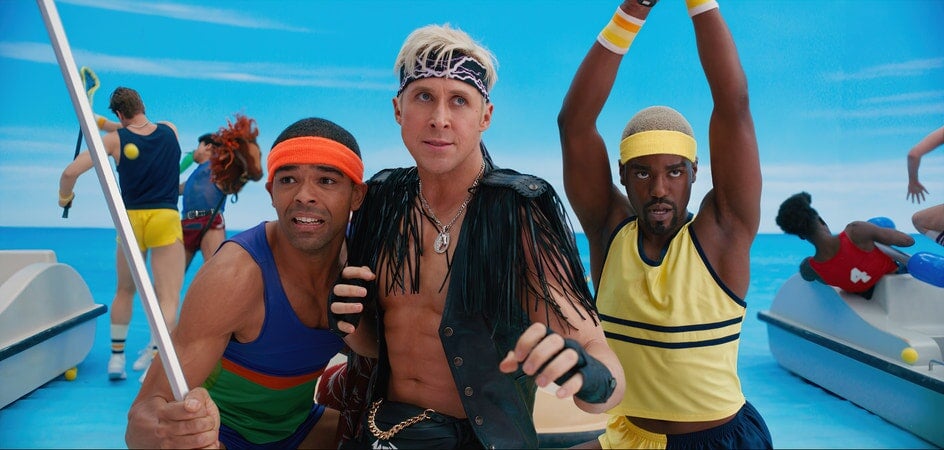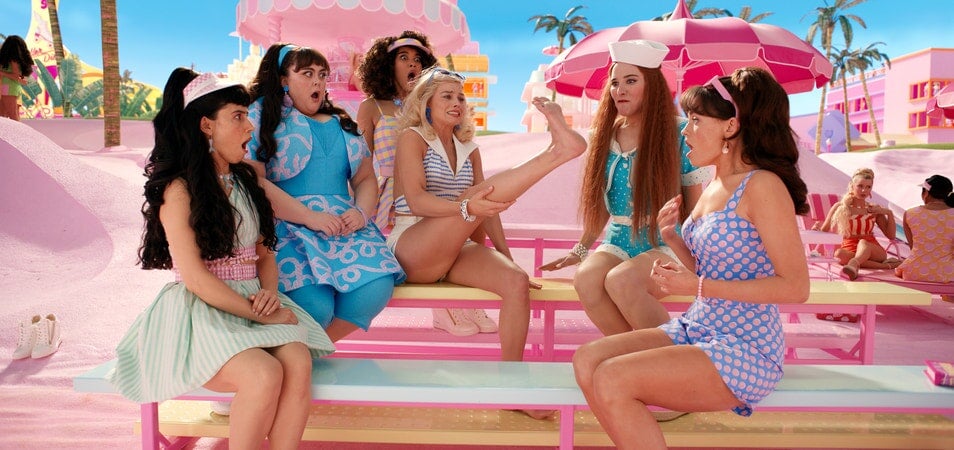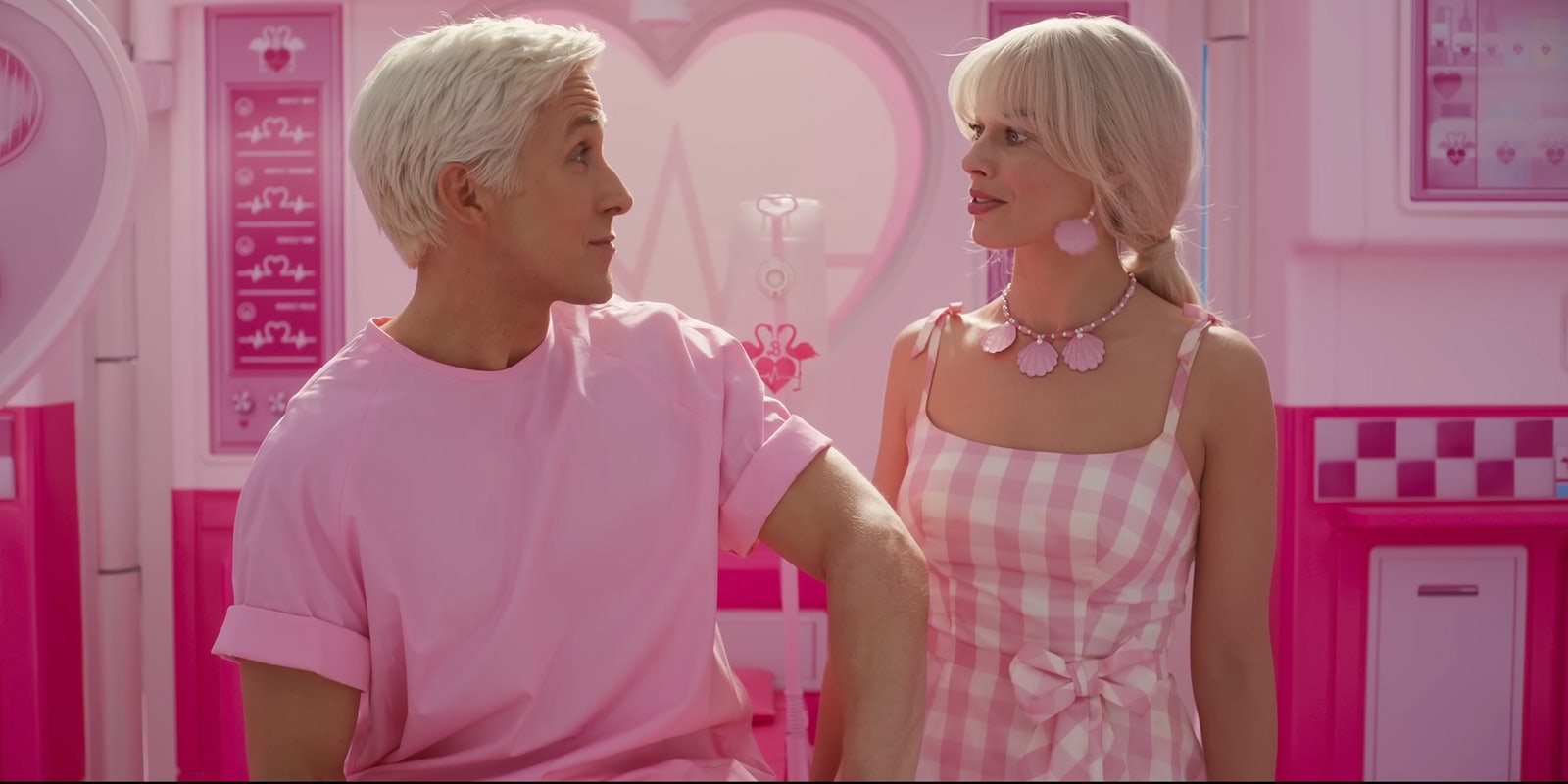The debate over Barbie’s feminist credentials was always going to be a nightmare. Yet despite the looming specter of corporate oversight, Greta Gerwig managed to deliver some enticingly complicated social commentary—particularly the topic of straightness, and Barbie’s lack thereof.
This article contains spoilers for Barbie.
Repeatedly rejecting Ken’s advances, Margot Robbie‘s Barbie welcomes queer readings. Meanwhile, Gerwig uses Barbie Land to explore a sly takedown of compulsory heterosexuality; the idea that heterosexuality is enforced by a patriarchal society, playing into the subjugation of women.
We all know Hollywood storytelling is built on hetero assumptions, from the stereotypical happily-ever-after to the way women get sidelined as love interests. Barbie delves into these gender roles with a cast of dolls, culminating in a patriarchal takeover where the Kens brainwash the Barbies into subservience.

Barbie’s promo tour made it abundantly clear that a Barbie/Ken romance wasn’t on the cards. Cast as a thwarted sidekick, Ryan Gosling’s Ken is a simp who launches a cartoonish Ken’s Rights Movement, overturning Barbie Land’s matriarchy.
Predictably, the film ends with Barbie striking out as an independent single woman. But instead of being a traditional empowerment arc about gaining self-confidence, Barbie’s finale involves embracing fallibility. Her single status is the easy part. In fact, Margot Robbie’s Barbie expresses such antipathy toward Ken that she easily reads as either gay or asexual.
She doesn’t need a man, but she also very explicitly doesn’t want a man.
What Ken wants
The matriarchial utopia of pre-revolution Barbie Land makes it easy for Barbie to avoid Ken’s clingy advances. Then when the Kens take over, they create an absurd parody of heterosexuality, reversing Barbie Land’s gender dynamics.
There’s a running joke that Ken’s job is “beach,” but really, his ideal career path is boyfriend. This poses obvious problems in a world where no one knows what a “girlfriend-boyfriend” relationship entails. After staking his entire identity on boyfriendhood, his only recourse is to invent a boyfriend-centric society.
If anything, the Ken revolution is less like men’s rights activism, and more like a satire of girlboss feminism: A movement where the Kens usurp their former oppressors, but don’t aim for equality or fair treatment for outcasts like Allan, who exists outside of Barbie Land’s gender binary.
Barbie was never a girlfriend
Onscreen, Barbie’s sexuality is effectively nonexistent. Aside from a one-liner from Kate McKinnon’s Weird Barbie, none of the Barbies express any interest in sex or men. They live in a perpetual Girl Power heaven of female friendship, which Greta Gerwig compared to the Garden of Eden.

When they venture out into the real world, Barbie realizes her own mortality while Ken gleefully discovers the patriarchy. This forbidden knowledge inspires him to transform the Kens from sycophantic himbos into an army of controlling boyfriends.
Consistently motivated by a desire for Barbie’s attention, Ken never really considers what Barbie wants. She isn’t interested in watching him do surfboard stunts any more than she cares for his obnoxious Matchbox Twenty serenade. In their own ways, the Kens and Barbies are all trapped by girlfriend-boyfriend expectations, ending with Barbie telling Ken to find his purpose elsewhere.
The queer connection between Greta Gerwig’s Barbie and Little Women
This relationship presents an unexpected through-line between Barbie and Gerwig’s last film, Little Women. (Not to mention Gerwig’s personal history of dating closeted gay guys, fictionalized in Lady Bird—and possibly some of the other Barbie/Ken pairings.)
In Little Women, Jo March’s great heartbreak comes from her refusal to marry a man. Her tumultuous friendship with Laurie inspires various interpretations: A tale of proto-feminist independence, unrequited love, or a young queer woman struggling to articulate her lack of desire for men. Plenty of people saw Saoirse Ronan’s gender-nonconforming Jo as queer or trans. The same goes for Stereotypical Barbie, who embodies every perky hyperfeminine cliché aside from being interested in boys.
Barbie’s attitude to straight romance couldn’t be more obvious. Her happy ending involves escaping Ken and the compulsory heterosexuality he represents. This breakup is harder on Ken, who does actually appear to have romantic drives.
The question here is whether Ken tries to kiss Barbie because he genuinely desires her, or if he’s just manifesting a way to secure his role as A Boyfriend. Shaped by Mattel’s incoherent expectations of Kenhood, he has a long road of self-discovery ahead of him.



